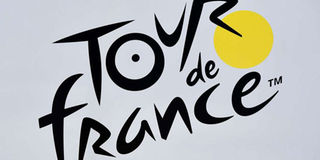Tour de France working on new start date

This file photo taken on July 3, 2019 shows the logo of the Tour de France in Brussels centre, three days prior to the start of the 106th edition of the Tour de France cycling race. The Tour de France is not only a French monument, but also the economic heartbeat of professional cycling itself and analysts fear heavy consequences if the coronavirus crisis forces its cancellation. An announcement is expected this week on either a postponement or an outright cancellation of the 21-day extravaganza that is currently scheduled to start in Nice on June 27. PHOTO | JEFF PACHOUD |
What you need to know:
- Originally slated to start from Nice with a caravan of around 4,500 people on June 27 and arrive in Paris July 19, there is no chance the event can go ahead as planned and organisers face a mammoth logistical task of rescheduling.
PARIS
Tour de France organisers are working feverishly in the shadows to find a new start date for cycling's biggest stage race after public gatherings were banned until mid-July in the latest extension of the French coronavirus lockdown.
Originally slated to start from Nice with a caravan of around 4,500 people on June 27 and arrive in Paris July 19, there is no chance the event can go ahead as planned and organisers face a mammoth logistical task of rescheduling.
So far organisers Amoury Sports Organisation (AS0) have remained silent publicly, but several mayors of the French towns along the planned route say they have been consulted on the matter of the new date.
French President Emmanuel Macron said in a televised address Monday that a strict lockdown in France would continue until at least May 11 and public gatherings were banned until mid July.
Tour director Christian Prudhomme has said previously that riders would need two clear months after the lockdown ended to get ready for the race, which is no longer possible given the May 11 extension.
France's Minister of the Interior Christophe Castaner spelled out on Tuesday that ASO had to reschedule or cancel.
"It is up to the organiser to analyse their ability to organise it and reschedule it," Castaner said on French radio.
Speculations surrounds a possible late July start, or mid-August, or even a September race.
ASO's reorganisation task is massive for an event with 21 start towns, 21 finish lines and over 3000km (around 2,000 miles) of route and 500,000 roadside fans per day.
"Social distancing on the roadside wouldn't be a problem, but in the start towns, at the finish line and in the VIP tents it certainly would," Belgian virologist Marc Van Ranst told Flemish tv station Sporza on Saturday.
Suggestions the tour could be held behind closed doors have been ruled out. Fans are a key element of the Tour which is synonymous with the holidays in France, with the party atmosphere popping as the caravan winds its way through the prettiest parts of the country.
"The Tour de France is 3000km of smiles," ASO chief Christian Prudhomme has said in reference to the holiday roadside gatherings. "We won't run a Tour de France without the fans."
Macron's announcement may have caught the organisers short and many people in France were surprised when the mid-July ban was announced.
A late July start for the Tour could be considered too close to that ban on public gatherings while also running up against another problem. To be able to race 21 tough stages, the athletes need to be in peak condition, and would ideally need a one-week preparation race before it.
ASO own the Criterium du Dauphine eight-day race and had been hoping to use that jaunt through the Alps in late June or early July. But that event has been postponed.
A second obstacle would be hotels, which would normally expect to be fully booked in the first two weeks in August.
A mid-August start would see the finish in September, meaning a clash with the Veleta a Espana.
The Tour could be staged in September, but would lose its own sense of identity by moving out of the holiday period.
There are only 176 riders on a Tour, but the whole event involves around 4,500 people with team staff, logistics, police and media all moving every day in a minor miracle of organisation.
Cancellation is the worst case scenario.
The "Grande Boucle", as the Tour is known in France, is the central economic pillar which supports the 22 professional teams on the roster for 2020.
"It's as simple as this. If the Tour does not take place, teams could disappear, riders and staff alike would find themselves unemployed," said Marc Madiot, the chief of top French outfit Groupama-FDJ.
The riders are also straining at the leash to race with 2018's Welsh Tour winner Geraint Thomas saying he was desperate for the race to go ahead.
"There are bigger and more important things to sort out first, but as soon as it's safe and ready to go, we (Ineos) would love it to happen," said the Ineos rider whose teammates Chris Froome and Egan Bernal have both won the Tour themselves.





